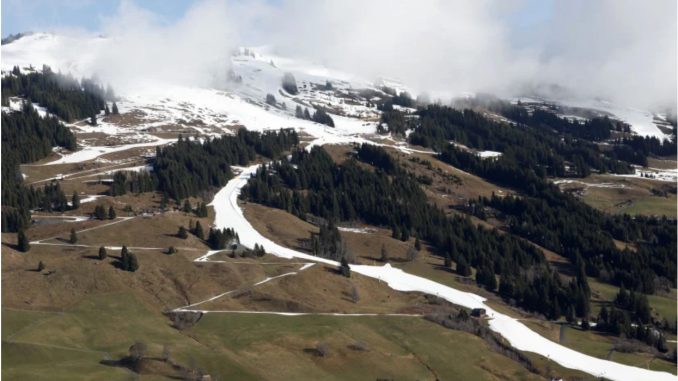
Climate change is an “existential threat” to winter sports and to tackle it, the world’s skiing governing body has teamed up with the UN’s weather organisation to benefit from its expertise.
Ski resorts around the world are increasingly facing the realities of a warming climate, its lack of snow, its shorter seasons and its economic repercussions for regions that rely on winter tourism.
The International Ski and Snowboard Federation (FIS) therefore hopes that its cooperation with the World Meteorological Organization (WMO), announced on Thursday, will help it give winter sports a future.
“The climate crisis is obviously not limited to FIS – or to sport, for that matter: it places humanity at a crossroads, no less,” FIS President Johan Eliasch said in a statement.
But “to put it simply, it is true that climate change is an existential threat to skiing and snowboarding” and “we would be failing in our duty if we did not do everything possible” to take into account the lessons of science and “objective analyses”, explains the man for whom environmental protection issues are not a new discovery.
Johan Eliasch, a Swedish-British multi-billionaire businessman and environmentalist, previously served as former British Prime Minister Gordon Brown’s special representative on deforestation and clean energy.
No race
Climate change poses a serious challenge to skiing, which already almost systematically uses artificial snow for most World Cup races, World Championships and the Olympic Games.
During the 2023-2024 season, the FIS organized 616 World Cup races in all disciplines, on 166 sites. The famous “white circus”, also criticized for these constant trips which increase the carbon bill of the competitions.
Twenty-six races were cancelled last season due to weather-related reasons.
At the 2022 Beijing Winter Olympics, the alpine skiing events were held in a drought-stricken region and the slopes were entirely generated with artificial snow. A water-intensive practice that had been roundly criticized by environmental protection organizations.
The WMO, which is partnering for the first time with an international sports federation, and the FIS want to work together to show the impact of rising temperatures on snow and ice, and to find practical ways to stimulate dialogue between science and sport.
“Ruined winter holidays and cancelled sports events are just the tip of the iceberg” in terms of climate change, says WMO Secretary-General Celeste Saulo.
“Retreating glaciers, decreasing snow and ice cover, and thawing permafrost are currently having a worsening impact on mountain ecosystems, populations, and economies at local, national, and global levels in the centuries to come,” she adds.
Ice World, Hot Topic
On 7 November, WMO and FIS will host a webinar for all 137 National Ski Associations, as well as venue managers and event organisers, on climate change and its potential impact on snow, ice and winter sports.
It will include an overview of advances in forecasting tools to support the optimization of snow management around ski resorts.
Earlier this year, the WMO executive council decided to make the cryosphere – the frozen parts of the Earth – one of its top priorities, amid growing concerns about melting snow, ice and permafrost.
About 70% of Earth’s fresh water exists as snow or ice, and about 10% of the land is covered by glaciers or ice caps, meaning changes in the cryosphere will affect the entire planet.
Leave a Reply